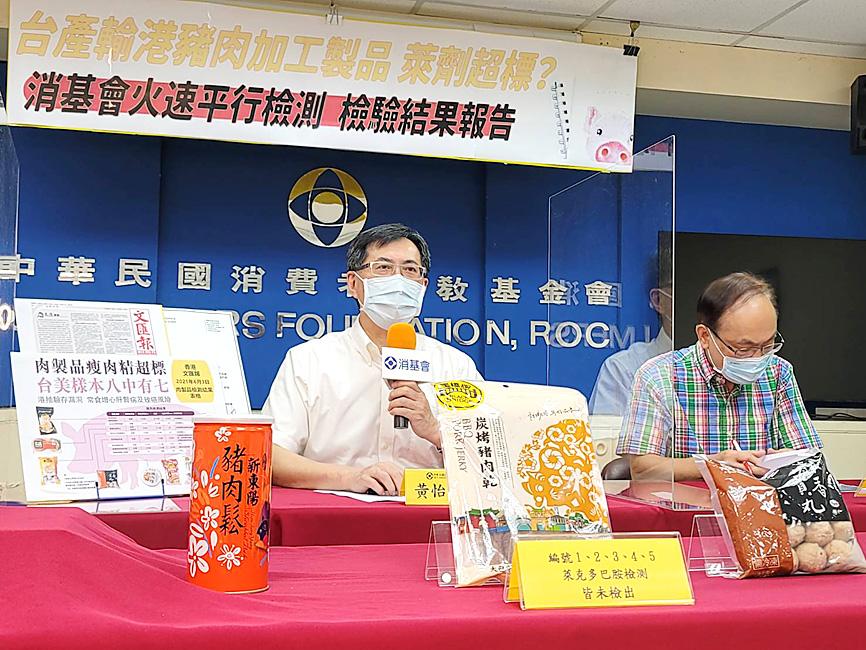Inspections of pork products exported to Hong Kong found no ractopamine residue, the Consumers’ Foundation said yesterday.
The foundation made the remarks after Hong Kong’s local Chinese-language Wen Wei Po reported that Taiwanese pork products were found to contain excessive ractopamine residue.
The newspaper on June 3 said that five pork products — four that came directly from Taiwan, and one marked as “from Taiwan and Canada” — had been found to contain 4.4 to 27.6 times the accepted amount of ractopamine residue.

Photo courtesy of the Consumers’ Foundation via CNA
Among the products named in the report were those made by Hsin Tung Yang, the Black Bridge and A Chun Wan Na.
To allay food safety concerns, the foundation said that it immediately launched an inspection of the products mentioned in the report by conducting parallel sampling of those that are sold in Taiwan.
As one product mentioned is not sold in Taiwan, the foundation sampled the most similar product being sold in the nation, it said.
All five products inspected carried no traces of beta-agonists such as ractopamine or clenbuterol, foundation chairman Terry Huang (黃怡騰) said.
The foundation has reached out to the Wen Wei Po reporter who wrote the article, asking them to share their source, but had not received a reply, he added.
The Council of Agriculture also tested the products in the article, all of which did not contain ractopamine residue, foundation secretary-general Hsu Tse-yu (徐則鈺) said.
Hsu accused Wen Wei Po of printing a report that was borderline “fake news” and for baselessly slandering Taiwanese pork products, calling on the paper to issue an apology to the companies involved, as well as Taiwanese hog farmers.
The Food and Drug Administration said it would speak with the Hong Kong government through the Taipei Economic and Cultural Office in Hong Kong, and that it is organizing local county officials to visit Hong Kong and inspect the products.
The foundation added that it planned to forward its findings to the consumer councils of Hong Kong and Macau.
The incident highlighted a lack of methodology for national inspections and standards for natural and processed pork goods, it said, urging the government to draft laws to solve the issue.

Eight restaurants in Taiwan yesterday secured a one-star rating from the Michelin Guide Taiwan for the first time, while three one-star restaurants from last year’s edition were promoted to two stars. Forty-three restaurants were awarded one star this year, including 34 in Taipei, five in Taichung and four in Kaohsiung. Hosu (好嶼), Chuan Ya (川雅), Sushi Kajin (鮨嘉仁), aMaze (心宴), La Vie by Thomas Buhner, Yuan Yi (元一) and Frassi in Taipei and Front House (方蒔) in Kaohsiung received a one-star rating for the first time. Hosu is known for innovative Taiwanese dishes, while Chuan Ya serves Sichuan cuisine and aMaze specializes

Taitung County is to launch charter flights to Malaysia at the end of this year, after setting up flights to Vietnam and Thailand, the Taitung County Government said yesterday. The new charter flight services, provided by low-cost carrier Batik Air Malaysia, would be part of five-day tour packages for visits to Taitung County or Malaysia. The Batik Air charter flight, with about 200 seats, would take Malaysian tourists to Taitung on Dec. 30 and then at 12:35pm return to Kuala Lumpur with Taiwanese tourists. Another charter flight would bring the Taiwanese home on Jan. 3 next year, arriving at 5:30pm, before taking the

Taiwan High Speed Rail Corp. (THSRC) plans to ease strained capacity during peak hours by introducing new fare rules restricting passengers traveling without reserved seats in 2026, company Chairman Shih Che (史哲) said Wednesday. THSRC needs to tackle its capacity issue because there have been several occasions where passengers holding tickets with reserved seats did not make it onto their train in stations packed with individuals traveling without a reserved seat, Shih told reporters in a joint interview in Taipei. Non-reserved seats allow travelers maximum flexibility, but it has led to issues relating to quality of service and safety concerns, especially during

An exhibition celebrating Taiwan and Japan’s comic culture opened on Saturday in Taichung, featuring a section that explores Taiwanese reproductions of Japanese comics from when martial law limited Japanese representation. “A Century of Manga Culture: An Encounter of Taiwan and Japan’s Youth” held its Taiwan opening ceremony at Taichung’s National Taiwan Museum of Comics after an initial one-month run in Japan’s Kyoto International Manga Museum between May 24 and June 24. Much like the Kyoto exhibition, the show mainly celebrates the comic connection between Taiwan and Japan through late Taiwanese comic book